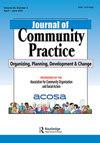Cultivating community change to promote food access and healthy eating through participatory action research with youth
IF 1.2
Q2 SOCIAL WORK
引用次数: 3
Abstract
ABSTRACT Professionals such as social workers, public health officials, cultural networkers, researchers, and community leaders, who are designing and implementing programs and policies, can look to youth to gain a unique perspective on promoting community health. Across the United States, many communities experience inadequate access to nutritious foods that exacerbate poor health outcomes for marginalized populations – people of color, older or disabled adults, and those with lower education or income. To address food access disparities, providing youth voice and building youth empowerment may offer creative strategies to encourage community change. The Youth CAN (Change.Activity.Nutrition) project aimed to engage and empower adolescents to become agents of change for health within their community. Youth became active researchers through participatory action research (PAR) using socially engaged art platforms such as photovoice (photography), street art (graffiti-style art), and spoken word (poetry) to explore their environment and identify facilitators and barriers to healthy eating within their community. The World Café activity facilitated conversation among youth and adults to generate ideas to improve community food access. Collaboration between adult and youth researchers, and community leaders led to proposed solutions for improving access to healthy foods within an urban, low-income neighborhood. The Youth CAN project demonstrated how engaging and empowering youth through PAR is fundamental in promoting positive youth development and enabling youth to become advocates for equitable food access in their communities.促进社区变革,通过青年参与行动研究促进粮食获取和健康饮食
专业人士,如社会工作者、公共卫生官员、文化网络、研究人员和社区领袖,他们正在设计和实施项目和政策,可以把目光转向年轻人,以获得促进社区健康的独特视角。在美国各地,许多社区缺乏营养食品,这加剧了边缘化人群的健康状况,这些人群包括有色人种、老年人或残疾人,以及受教育程度或收入较低的人。为解决粮食获取不平等问题,提供青年发言权和增强青年权能可能提供鼓励社区变革的创造性战略。青年CAN(改变、活动、营养)项目旨在让青少年参与进来,并赋予他们权力,使他们成为社区内健康变革的推动者。青年通过参与行动研究(PAR)成为积极的研究人员,利用社会参与的艺术平台,如photovoice(摄影)、街头艺术(涂鸦风格的艺术)和口语(诗歌)来探索他们的环境,并确定社区内健康饮食的促进因素和障碍。世界咖啡活动促进了青年和成年人之间的对话,以产生改善社区粮食获取的想法。成人和青年研究人员以及社区领导人之间的合作提出了解决方案,以改善城市低收入社区获得健康食品的机会。青年CAN项目表明,通过PAR吸引青年参与并赋予青年权力,对于促进青年的积极发展和使青年成为其社区公平粮食获取的倡导者至关重要。
本文章由计算机程序翻译,如有差异,请以英文原文为准。
求助全文
约1分钟内获得全文
求助全文
来源期刊

Journal of Community Practice
SOCIAL WORK-
CiteScore
2.40
自引率
18.20%
发文量
27
期刊介绍:
The Journal of Community Practice is an interdisciplinary journal grounded in social work. It is designed to provide a forum for community practice, including community organizing, planning, social administration, organizational development, community development, and social change. The journal contributes to the advancement of knowledge related to numerous disciplines, including social work and the social sciences, urban planning, social and economic development, community organizing, policy analysis, urban and rural sociology, community health, public administration, and nonprofit management. As a forum for authors and a resource for readers, this journal makes an invaluable contribution to the community"s conceptualization, applications, and practice.
 求助内容:
求助内容: 应助结果提醒方式:
应助结果提醒方式:


